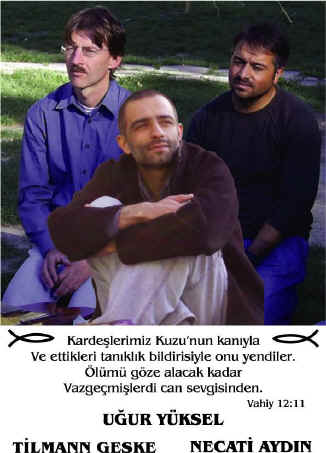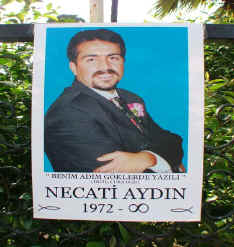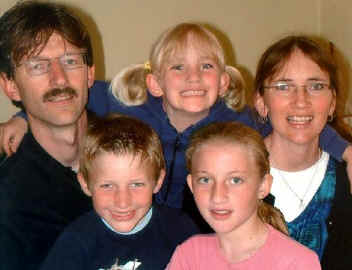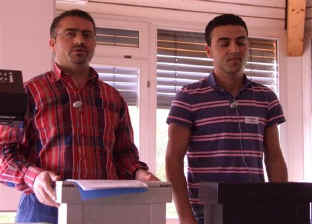Tilmann
and Susanne Geske with their three children
That
morning the five killers took time for a special namaz
(biat) in a back room of a nearby shop before setting off on their
macabre mission. They arrived at
11 o’clock
in a rented car and walked up to the Zirve office, carrying three guns
with them, all equipped with silencers. Concealed under their jackets were
knives, rope and thin plastic gloves. The evangelists began instructing
them, but the talk apparently took an ugly turn, when shouts and
blasphemies were heard in neighboring offices.
The telephone line was abruptly cut and the door locked. This was
the point when apparently the attackers pulled their guns. They pounced on
their victims, gagging them quickly with lengths of cut towel they had
taken from the bathroom, and tying their hands and feet to their chairs.
The cell phone camera was activated to record the grisly scene.
The
stage was set for the savage torture which included disemboweling the
victims, slicing the skin from the bones of their fingers, stabbing them
countless times and slitting their throats from ear to ear. Nejati’s
mouth and throat area were severely mangled because of hatred for his
witness for Christ. The young men were well aware of their Book’s exact
instructions: “I will cast a dread into the hearts of the infidels.
Strike off their heads and strike off from them every finger tip.
This, because they have opposed God and his apostle … verily God
will be severe in punishment.” (Q.: Sura “The Spoils’ 8/12; for a
similar order cf. 47/4.) The attack was so violent that one of the
abandoned knives on the floor was completely bent out of shape. The
protracted torture lasted about three hours. According to the statement of
the killers, during this time the cell phones and doorbell were ringing
continuously. Finally, the
police had to forcefully break the door down, where they were confronted
with the appalling scene. Then
two of the victims were released as they entered into the company of
martyrs for Christ, followed shortly thereafter by the third. The killers
who actually were obeying the dictates of their book did not hesitate to
employ the sword of Islam against their fellow-countrymen who had dared to
abandon their religion in favor of Christ their Savior and his witness.
For this they became objects of the most ferocious savagery that
Christians in
Turkey
had ever endured.
The
killers acted with the same disposition and resolve which consumed the
seventeen Al Qaeda terrorists who commandeered the four passenger planes,
using them as missiles, on that fateful day of
September 11, 2001
. Thousands of violent deaths
and incalculable destruction were the outcome.
The philosophy in both cases was that the people targeted were on
the wrong side and needed to be put out of the way, according to Allah’s
command. The malice, hatred
and vindictiveness were identical.
Extensive Torture, Culminating in Slaughter
After
the pseudo-seekers were greeted cordially by the unsuspecting evangelists
they were offered a glass of tea in the office.
The three Christians started explaining the teaching of the Bible
and answering their questions. It
is not known after how many minutes the culprits attacked.
People in other offices of the building were later asked by the
police if they had heard anything suspicious.
Most of them said that they thought there was a loud argument going
on. They could not imagine
that the Christian office was the scene of multiple torture and murders.
At one point Nejati’s wife Shemse phoned the police, saying that
she could not get in touch with her husband on his cell phone.
Some time later the police arrived, finding four of the attackers
carrying on their self-appointed act of execution.
The fifth, Emre Günaydın, who was the ring-leader, attempted
to make his getaway by jumping out of one of the third storey windows. He
had intended to travel on to Izmit in western
Turkey
to kill another German pastor, Wolfgang Hade, who happens to be Shemse’s
brother-in-law. Emre was not
meant to carry out another pernicious scheme. Upon hitting the pavement he
sustained severe injuries and was rushed to the hospital. Later his
friends related that he is a vindictive and violent person.
According to the statement of the policemen who entered the office,
a shocking scene met their eyes. The
men lay on the floor in pools of blood.
One of the evangelists, Uğur Yüksel, had not yet died. It is understood that he was not assaulted at
first, but left to witness the slaughter of his friends.
In the meantime, the killers were commanding Nejati to deny
Christianity. Finally Uğur’s
turn came, but they didn’t have enough time to finish him off.
An ambulance arrived on the scene and immediately carried him to
the hospital where he died within a few hours. The German ambassador, Dr.
Eckart Guntz, who later came to
Malatya
from
Ankara
, said, “I was thoroughly disconcerted that in our time such a crime
could be committed in the name of religion.”
The five murderers all lived at a ‘Vakif’
(religious endowment) hostel in the city ― Emre Günaydın, 19,
whose lawyer later tried to prove to the court that he was under eighteen
(probably because of his small stature), Salih Gürler, 20; Juma Özdemir,
20; Hamit Cheker, 19; and Abuzer Yıldırım, 19.
They systematically carried out the triple execution in cold blood
within a few hours. It later came out that all five were determined pawns
of an ultranationalist movement, sworn enemies of Christ and his faith.
It also came to light that they were in close touch with the
notorious Ergenekon gang. They
established a trusting relationship with the three slain men who could
never have imagined that they were targets of a deadly plot.
Later when the police searched the young men’s rooms in their
hostel, among other items that they found was this letter, “We are going
to death; all five of us are brothers.
It might be that we won’t return alive.
Abnegate your religious claim on any of us.”
(Hakkınızı helal edin, i.e., “disclaim your
legitimate right on any of us.”) This
is a typical Islamic demand, frequently used by people who may have hurt
someone and in departing they don’t want the grieved party to carry a
grudge against them before Allah. The
five attackers had sworn the sentence of death upon themselves.
They were obsessed with the desire for their own martyrdom.
The martyrdom concept of Islam should be mentioned here.
To die for one’s religion or country is to be counted a martyr.
Today if a soldier dies during military service, he is a martyr.
This belief is entirely opposite to martyrdom in the Christian
faith.
These five nationalistically-motivated killers successfully
contrived their strategy to lure the three martyrs.
The ruthless executions shook the whole country and the outside
world. The horrific killings
were meant to send a warning to all Christians throughout
Turkey
, and particularly to those engaged in any Christian activity.
Prior to their notorious act, there were ominous signs of a
sinister plan about to be carried out; however no one could have imagined
its heinous magnitude. Politicians
were indicating their displeasure about the spread of the Christian
witness among Turkish people. The
odious attitude of the nationalistically-oriented media, including a
number of TV channels, was becoming more venomous by the day. Naturally,
most of the press was aiming at boosting their circulation, capitalizing
on the sensitive issues of religion, nationalism and connivance against
the ‘motherland’. With
the Islamic government of AKP at the helm, the general feeling in the
country was increasingly plain that Christians were not to be trusted or
endured.
On one hand, the conservative Recep Tayyip Erdoğan government
was forcefully pursuing the goal of
Turkey
’s acceptance into membership of the European Union. For a protracted
time
Turkey
was displaying a veneer of being democratic with free speech and the
recognized right to spread one’s faith.
While this was going on, Christians were being beaten, such as
happened to Yakup Jindirli, while he was offering New Testaments to
interested people. This young
man sustained severe brain injuries resulting from the attack by a group
of ultranationalists (Gray Wolves) in Orhan Gazi,
Bursa
, in western
Turkey
. In several places, churches
were stoned or set ablaze. The ‘Agape’
sign of the
Samsun
church on the
Black Sea
coast was defaced with graffiti and windows of their meeting place were
shattered by huge stones. A
number of court cases were opened against Christians with the accusation
that they had insulted the Prophet or Turkishism.
The designation ‘Christian’ became synonymous with treason,
agents of foreign powers. The term ‘missionary’ became the dirtiest
word of slander in the Turks’ vocabulary. The outlandish accusations of
irresponsible inciters could be elaborated on. Individual Christians were
receiving nerve-wracking threats and some were kidnapped, including one
child. A few foreigners had to
quickly sell everything and get out of the country.
First it was Father Andrea Santoro, priest of the Santa Maria Roman
Catholic Church in
Trabzon
, on the
Black Sea
coast. While serving mass, he
was viciously gunned down by a nationalistic teenager, instigated by
like-minded plotters. At the close of his court case, his mother looked
squarely into the camera and said, “My son is going to prison for
Allah.” Later, Father Pierre Francoise Brumisseu in
Samsun
and Father Andriano Franchini in
Izmir
were assaulted with knives, but providentially not killed. The villain in
the Franchini attack, Ramazan Bey, seventeen years of age at the time of
the assault against the sixty-five year old priest eventually was
sentenced to four and a half years in prison after a somber reprimand from
the judge. Before all these
crimes, in a modern section of
Istanbul
, a young stooge of the ultranationalists fatally shot the well-known
Armenian journalist Hrant Dink in front of the apartment building in which
his newspaper office was located.
Turkey
’s Protestants noted that 2007 had been a dark year with a very serious
and threatening impact on their infinitesimal community.
In addition to the
Malatya
brutality, nineteen specific incidents of intimidation and violence
against church leaders and church buildings were reported to security
officialdom. A number of
pastors are under continuous police protection and several churches hire
security guards to ward off attacks from nationalist hoodlums.
The Role of the Media
A considerable segment of the media, including some
publicity-seeking TV channels, had previously been calling Christians
involved in evangelism, ‘provocateurs’.
They were accusing them with a well-known Turkish saying,
‘Selling snails in a Muslim neighborhood.’
(Muslims don’t eat snails, so the implication is, keep your
teaching out of their neighborhoods.)
Even following the horrific massacre, the wrath of the public was
not against the killers but against the men who had brought this murder on
themselves. This is the logic
which has been prevailing in these parts for centuries.
Much falsehood has accompanied all similar incidents, generally
centering on the accusation that Christians who actively proclaim the
message of Christ are plotting to bring division among various segments of
the population and destroy the unity of the country.
The nationalistic segment of the media was prevaricating the facts
by stating that if Christians were merely engaged in a religious effort
they wouldn’t mind at all, but behind all Christian activity there are
hidden motives. Those who spread the Gospel are involved in political
maneuvers under the guise of religion.
Prior to the massacre, an active witch-hunt was underway.
Fabricated reports were widely circulating that in
Malatya
there were many house churches, the figure ranging from forty-eight to
ninety-six, and this had to stop! They
had to get to the root of the problem so this massacre was one step in
squelching the spread of the Christian message.
If a brutal act such as this had occurred in any other country, the
Minister of the Interior would have had to resign. However in
Turkey
, such incidents don’t jeopardize an official’s position. The same
minister is still sitting tight in his office.
A clear example of the intense incitement could be seen in a caustic
statement issued in 2006 by İzzet Altunbashlı, leader of an
extreme racist organization, against a newly-formed church: “This is
treason against our Muslim and Turkish identity.” Such expressions of
bigotry have been evident in several cases during the past few years.
The ultranationalists take the law into their own hands, using
young people, even psychopaths, as tools of their malevolence.
The public is generally fed the rhetoric of these rabid
nationalists. In their thinking the country has been invaded by cells of
betrayers who have to be dealt with. İzzet
Altunbashlı continued his polemics by making inflammatory remarks
about the newly-started church: “This is a center where covert goals of
missionaries lurk behind their overt activities.
The church exists for the purpose of dividing our people and
country.” These news
reporters also assert that churches are involved in sex and prostitution.
At the time of the massacre, their target was the Samsun Agape
House. Churches officially are
not designated as such, but as ‘house’ in keeping with the law.
The accusation was that young people were being lured to the
religion of the missionaries with lavish enticements.
Another critic, Lütfi Keskin, aiming at the same church, wrote in
the newspaper ‘Ekip’,
“Church visitors were being handed hundred-dollar bills slipped into the
pages of the New Testament. By
this bait they were being encouraged to spy on their own country.” In
the
June 14, 2007
issue of the liberal ‘Tempo’
magazine, Ms Saygı Öztürk quoted Emre Günaydın, the leader of the
group of the
Malatya
murderers, “If I could have managed to escape without getting hurt, more
missionaries would have been removed from the scene.”
As mentioned already, he had plans to make the long journey to
Izmit to kill Wolfgang Hade, another German missionary.
The Complicated Investigation
The
Malatya
massacre changed the picture of Christian activity throughout the country.
Turkish pastors and Christian believers intensified their security
precautions, which were already in effect.
For some time the state felt under compulsion to assign police
guards to several pastors to protect them from attack.
Back to Emre Günaydın, who had made this extravagant promise to
his fellow conspirators, “These people have much money.
We will lay our hands on it and solve our need for funds.”
Emre talked about his previous contacts with Wolfgang, to whom he
had presented himself as a person with no religion.
When he visited Zirve bookstore in
Malatya
, he introduced himself in the same way.
His and his fellow-conspirators’ pretext was that they were
seekers of the truth. Actually,
on that infamous morning, they had come to the office for a ‘Bible
study’, while their real motive was to murder their unsuspecting
instructors. During the court
case it came out that the killers, always pretending to be seekers, had
been in touch with the victims and other missionaries for eight months,
carrying on their devious probe.
Observers
of the developments point to an inconsistency in the investigation before
the case was brought to court. It
came to the attention of the authorities that Emre Günaydın had
changed his mobile device five times during the preceding six months.
It was also verified that he had made thirty-five calls, which
remain secret. The suspect had
a number of conversations using his telephone card which are not recorded
anywhere. The photos taken by
hidden camera in Günaydın’s room during his nine-day hospital stay
were deleted. It has been
substantiated that throughout the previous six-month period the suspects
had telephone conversations with members of the police force, prosecuting
attorneys, members of parliament, Islamic school teachers and private
security members. All these people talked with the killers, according to ‘Milliyet’
newspaper. Plaintiff lawyer,
Engin Jin, demanded that the criminals be tried as perpetrators of
genocide rather than as ordinary ‘hit men’ in accordance with the
newly-accepted Turkish penal code. They said that this is not a case of
five murderers on trial, but a wider collusion.
The aim of the two groups was to annihilate members of the
Christian community one by one. The
investigation and reporting of the string of events leading to the
massacre are shrouded in mystery. To
mention one example, the court refused access to the five murderers’
computer data.
As has already been observed, Emre Günaydın was in direct contact
with at least two members of the Ergenekon gang.
Eighty-six collaborators of this notorious ring were arrested after
their scheme was uncovered. Among them were two retired generals,
journalists, lawyers and other nationalists from several walks of life. In
the meantime, some have been released and others
have been arrested. All these functionaries belong to what is known as ‘
Deep
State
’. High profile attacks, murders, even overthrowal of the Turkish
government, were all on the agenda of this conspiratory coterie. A
recent trial of the Ergenekon gang revealed a whole world of frightening
connivances. The meticulously
organized subversives pursued the aim of replacing the Islamist Turkish
government with a radical nationalistic junta. At Gölbaşı,
a town not far from
Ankara
, the capital, a cache of arms was unearthed.
Many weapons, hand-bombs and other explosives were found.
This discovery became a burning issue in the media and government
circles. It has come to light
that the Ergenekon gang had a broad list of intended assassinations,
including
Turkey
’s prime minister, members of the highest court and Armenian community
leaders.
The
plaintiff attorneys demanded that the Ergenekon file be brought from
Istanbul
and incorporated into the
Malatya
massacre trial. This would introduce evidence to the bench that a
religious genocide was in the making.
The connection of the
Malatya
murderers and the Ergenekon gang would finally bring to light that there
was a country-wide conspiracy against Protestants whose presence was
declared to be a menace to the state. In subsequent court cases, some
documents from the Ergenekon preliminary investigation were brought to
Malatya
.
Emre Günaydın repeatedly accused the missionaries of
denigrating the prophet of Islam. Some
of the killers openly associated the martyrs with PKK, the outlawed
Kurdish Marxist faction, carrying on its warfare for an autonomous
Kurdistan
. Others said that they were supported by the CIA, even by the Israeli
Massad agency. Some of the
volunteer plaintiff lawyers were accused of having defended gays and
lesbians. Such was the
diversity of disparaging insinuations, all calculated to besmirch the
martyrs. The whole spectrum of
the religio-nationalistic community became mobilized in order to minimize
the monstrosity of this crime.
The plaintiff attorneys insisted that the police video footage of
the crime scene taken hours after the murder had been tampered with. They
also pointed out that guns had been swapped, apparently with official
consent. The gun fired at the
outset of the crime was nowhere to be found; it had been replaced by
another one. In the footage,
police arguments regarding the guns were heard.
The lawyers were allowed to look at the footage under the watchful
eyes of the police. The
attorneys prevailed in their insistence on having part of the footage
shown in the courtroom. The
projection of the horrendous slayings threw the friends of the martyrs
into anguish and loud sobbing. Uğur was repeatedly calling on the name of Christ: Mesih,
Mesih! (i.e., ‘Messiah, Messiah!). Tilmann,
in apparent agony, was raising his hands toward heaven.
During the extended duration of the crime, the criminals were
strolling among their victims in obvious satisfaction.
The appalling scene of the mutilated bodies in pools of their own
blood would have touched the stoniest of hearts. Incredulously, Emre Günaydın
and Salih Gürler were smirking at the despicable sight.
The other killers turned their heads away from the hideous picture
before their eyes. The judge
ordered them to look at the screen, “It is because of you that we are
exposed to this loathsome scene,” he said.
Abuzer Yıldırım addressed the judge with a telling reaction: “This
whole thing turns my stomach!” The
audience probably struggled to find an answer to the question, “Could
there be any element of remorse in these hearts?”
Such an abominable accomplishment will quite likely in the end be
laid at the door of the ultranationalist Ergenekon mob.
This cabal clique never restrained themselves from expressing their
extreme hatred of non-Turks. The staggering oddity is that one of their
top protagonists, Ms Sevgi (love) Erenerol ― under arrest ― is
of Greek background. Her
family claims to represent the Patriarchate of the bogus Turkish Orthodox
church. The absurd views of the Ergenekon gang were reflected in a court
session by one of the defense lawyers: “Why are so many foreigners
living in
Malatya
?”
At the trial the prosecuting attorney presented thirty-one files to
the court, sixteen of which dealt with inconsequential Christian
activities in the country and particularly of the three murdered men who
had all of a sudden become suspects. The names, addresses and other
detailed information of Christian workers across the country were included
in this collection. Irrelevant harmless travels and conversations of
missionaries were all documented to the minutest detail. Anyone hearing
the trifling accounts in these non-pertinent files would conclude that the
Christian faith was on trial and freedom of religion defied.
The activities of Christians were termed ‘questionable’.
The plaintiff attorneys requested that the court remove the sixteen
files dealing with the work of missionaries because according to the
Turkish constitution nothing illegal was being done by them.
Therefore their involvements could not be categorized as
‘questionable’. This
request was rejected by the court. In
the face of such partiality, the lawyers appealed to a different court to
take the case under its jurisdiction.
This request was also rejected and the trial is dragging on in the
Malatya
court.
In one of the court sessions attention centered on witness Metin Doğan,
handcuffed as he was brought in. He
is already serving a prison sentence for another crime.
He was a former enlisted officer in the military.
He told the court of being a member of the MHP (Extreme Nationalist
Party) from his early youth, and that he knew Günaydın well.
On one occasion, Metin was invited to the Party center in
Malatya
where he met two men who ordered him to threaten the three evangelists and
then kill them. They reassured
him that they would clear his name from all legal involvement.
According to his statement one of the two was the retired general,
Hikmet Chelik, who was quite adamant in his demand.
Metin however refused to follow those orders.
One of the two said to Doğan, “We will break the pens of the
missionaries.” Another
ultranationalistic clique obviously involved in the plot was the Aegean
Army. This faction falls into the category of ‘
Deep
State
’ (all governmental functions combined).
The five criminals are isolated from each other in prison.
And during the trial, taking of photos is prohibited.
Another witness, brought to the court in handcuffs, was a local
journalist, Bülent Aral. He
was being accused of acting as liaison between the murderers and the
Ergenekon coterie. The
citation against him was that he had induced Emre Günaydın, the ring-leader, to target the evangelists because missionaries are
‘an extended arm of PKK’ and so deserve to die.
Aral told the five that he had influence with the higher-ups and
would absolve them from any prosecution.
Later he was also arrested. Aral denied having such a hold on the
gang of killers. However, a
suspicious web of conspiracy could be detected between Aral and the five.
He was constantly returning to the trivial line that missionaries
were catering to the goals of PKK. Emre
insisted that Aral had promised to clear him of any guilt.
During one of the sessions, with the permission of the chair Emre
directed a question to Aral: “Where is the support that the higher-ups
were going to provide for us?” The
matter has become so complicated that in a later sitting Emre rescinded
his accusation against Aral. The
ongoing case is becoming more complicated by the day. Many wonder how long
it will be dragged out and what the outcome will be.
The
latest stratagem of the chieftain of the crime, Emre Günaydın, was to
embroil Huseyin Yelki, 34, in the murders in order to deviate
the course of the case. As a result
of this accusation, Huseyin Yelki
was arrested on February
9, 2009. Yelki, who is a
resident of Malatya,
is a convert to Christianity and former employee of the Zirve bookstore.
He had witnessed in one of the court sessions concerning his
employment there. Following the
crime, Huseyin left his work, unwilling to continue living in
Malatya. Emre
Günaydın
who from the very outset resorted to preposterous
tactics to veer the court’s attention from the normal procedure has now
dropped this bombshell. While it has
not been determined that Huseyin Yelki
had any connection with Emre or the Ergenekon gang the court decided to
arrest him and now he is in prison.
The plaintiff attorneys presently cannot point their fingers at any
incitement by Yelki to kill the three Christians.
The Funerals
The
funeral services of the three martyrs took place in different cities.
Tilmann Geske, 46, had been living in
Malatya
for ten years. His wife
Susanne decided to have him buried in the old untended Armenian cemetery
outside the city. Some
Christian men who had come from other places grabbed shovels and dug a
grave for their slain brother. In
the past this graveyard accommodated the Armenian community in
Malatya
. There is just a handful of
Armenians there now. It was a touching service; many Turks who attended,
including the governor of
Malatya
, witnessed the difference between a Christian’s internment and the
hopeless burial of Muslims. Susanne
said at the court that she would continue living in
Malatya
, which she is doing with her three children -- Michal, Lukas and Miriam.
She expressed gratitude to her Turkish neighbors who had brought her food
for three days following the tragic event.
She mentioned that even the imam of the neighborhood visited her,
offering his condolence.
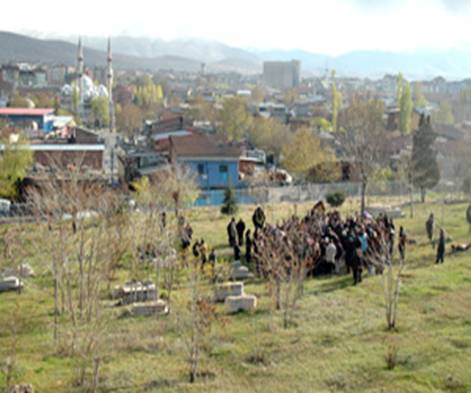
Graveside
service in
Malatya
The
body of Uğur Yüksel, who hailed from an Alevi (Islamic sect)
background in Elazığ (east
Turkey
), was claimed by his parents. Legally,
they were the ones entitled to bury him.
He had been engaged to a Turkish Christian girl, but not yet
married; the fiancé had no right on his remains.
The father made funeral arrangements with the Alevi community in
his city. The paradox is that
this Christian martyr, killed by fanatic Muslims, was buried in the midst
of Muslim graves with meaningless Islamic ritual, all in Arabic.
His fiancé was watching from the shadows as his family and friends
refused to accept in death the faith Uğur had so long professed and
died for. The father being heavily pressured by his circle tried to
underplay Uğur’s Christian commitment and martyrdom for Christ.
He insisted that Uğur was a Muslim until his death and had
joined the Christians because he was unemployed and needed income.
“My son did this only for the sake of steady employment,” he
said. Later as a witness in court, he gave a rather confused account.
The irony of it is that Uğur’s
application to alter his religious designation from ‘Muslim’ to
‘Christian’ had been approved by the court in Elazığ a long
time before.
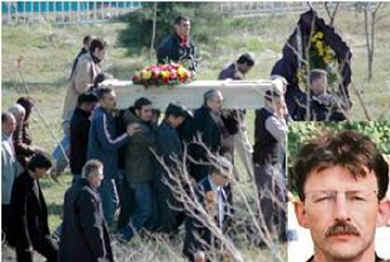
Christians
carrying Tilmann Geske’s coffin in Malatya

Huge crowd outside
Buca
Baptist
Church
in
Izmir
The
third funeral was remarkable. In
spite of the vehement protests of Nejati Aydın’s relatives, his
wife Shemse had legal right to arrange the burial of her husband. Before
flying the body from
Malatya
to
Izmir
, the coffin was put through the x-ray machine twice at the airport
because of the suspicion that there might be explosives inside! The
touching funeral service of Nejati was held at the formerly Anglican,
presently Baptist, church in the Buca section of
Izmir
, just weeks before his thirty-sixth birthday.
Over five hundred people attended, including the deputy governor.
It was a Christ-honoring service for this Turkish martyr in the presence
of many Muslims. Newspaper
articles stated that all of Nejati’s family members were adamantly
opposed to the faith of their dead son and brother.
His sister Zeynep became spokesperson for the whole clan, none of
whom attended the Christian funeral. Zeynep
was belligerent and intimidating. She
exclaimed, “We could have come with three hundred people and create a
scene,” and then added, “but we abstained from it because our religion
forbids it!” Of course, many
believed what she said.
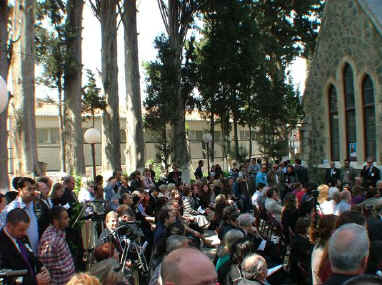
Crowd
in shade outside
Buca
Baptist
Church
Through
her acerbic statements, Zeynep approached the point of exonerating the
five criminals. She said that the Christians were the ones who had
instigated the crime. Her
brother Nebil Aydın spoke along the same lines.
They claimed that Christians had kept Nejati in a mental prison.
Her wish was to take Nejati’s two children and rear them as
Muslims, but she could have no claim on them since they were under their
mother’s jurisdiction. Like
Uğur’s father, she too insisted that Nejati joined the ranks of the
Christians for monetary advantage. She
went on to warn all parents to control their children and prevent them
from becoming Christians. Further,
she demanded that the state put an end to all missionary activity.
In the midst of all this extreme agitation, Shemse’s two young
children were constantly asking her, “Mommy, will we also be killed
because we are Christians?” Shemse
later brought this out when she took the witness stand in court. She and
her two children are now safely outside the country.
Lawyers
The
appalling murders drew deep sympathy from the community of liberal
individuals. Nineteen lawyers volunteered their services to take part in
the trial and speak out for the murdered Christians.
The Protestant community did not want to leave these generous
lawyers without any compensation, as they had traveled long distances from
Istanbul
and
Ankara
to
Malatya
, stayed in hotels and incurred other expenses.
Christians in
Turkey
as well as those from other countries contributed to defray at least part
of their costs. The spokesman
for the team of plaintiff lawyers is Orhan Kemal Jengiz. When he began
receiving threats the police authorities in
Ankara
assigned him an armed bodyguard. Mr.
Jengiz is also a capable writer for the English newspaper, ‘Turkish Daily News’. His
articles are penetrating and thought-provoking.
The
following poignant excerpt appeared on April 27, nine days after the
massacre:
“
Turkey
was buried yesterday in the darkness of the Middle Ages. For a long period
of time the seeds of intolerance, racism and enmity against Christianity
have been sown in
Turkey
. Now those seeds are being harvested one by one. The murder of Father
Santoro, Hrant Dink, and the
Malatya
massacre are in a sense connected. It is very possible that after this
incident we will listen to the same speeches that we have heard before and
face the same old conspiracy theories. The conspiracies that various
intelligence organizations are attempting to stir
Turkey
up will again be discussed. The dark forces that are trying to stop
Turkey
's advancement will be addressed. The short-cut logic used will cast the
problem wholly on ‘the others’. After the shock is passed we will
listen to the same chorus, the same song of intolerance; they will
continue to sing the songs that turn the seeds of hate into a fruitful
harvest. Without looking in the mirror, they will pretend the blood that
has been spilt has not implicated them. Without feeling, they will
continue on in their ways from the place they started.”
The lawyers, a few of whom were women, immediately came under attack
as some of them had participated in the case of the assassinated Armenian
journalist Hrant Dink. Also
the fact that some of these lawyers had taken part in the trials of the
PKK (Kurdish Leftist Movement) was reason enough to associate the martyrs
with undesirable groups.
One of the defense lawyers began questioning a witness who testified
on behalf of the murdered three about whether Christian missionaries had
any authority delegated to them to spread Christianity in a Muslim
country. A plaintiff lawyer
was outraged at this question because it violated the constitutional right
of any individual to express his beliefs.
Such ill-conceived questions occupied many sessions.
The judges’ refusal to remove the blatantly biased sixteen files
opened the way to such extraneous questioning.
One could surmise that a first-page headline in the newspaper ‘Taraf’ was answered at the court. The headline quoted an
ultranationalist’s sentiment which aimed to sidetrack the crime,
“Don’t bother with the murders; tell us about missionary work.”
(Ed. Recently a Christian missionary in the northern part of
Cyprus
, which is under Turkish occupation, was warned with this threat,
“Remember Malatya”.)
The plaintiff lawyers objected to irrelevant information which was
not associated with the crime. Orhan
Kemal Jengiz stated in the court that prior to any act of violence against
Christians a smear campaign had been carried on and Protestant
missionaries were the target of such inciting coverage.
The appellation ‘missionaries’ has been the most repulsive word
in Turkish for a long time. National
institutions do not hesitate to postulate this image.
This concept is being taught in schools, in military units and many
associations throughout the country. They
have made the historic ‘missionary’ image the most menacing threat to
national security. The
nationalists’ vision of
Turkey
is a country without any Christian citizen.
Since the matter of finances has been mentioned, a very sad
development of the ordeal must be brought to light.
As has happened in other situations one regrettable financial
manipulation has occurred in this sacred crisis.
A self-appointed ‘representative’ by the name of Naim Aksham
circulated a letter, graphically depicting the massacre and appealing for
funds to support the widows and their children.
Who knows how much money he collected in the
U.S.A.
! In actuality, funds for the
widows and their families are being administered by the Turkish Union of
Protestant Churches who properly handles this important need.
Naim would not accept this arrangement, but capitalized on the
sympathy of people everywhere to collect money, which he in turn did not
channel to the trusted Association of Turkish Protestants, but apparently
used for other purposes. The
gossip-hungry news media made the most of the scandal, reporting that two
million dollars (their own assumption) of the solicited funds went into
personal use. This stirred
deep consternation among all believers in
Turkey
.
Lives of the Martyrs
Nejati
Aydın. Nejati’s home city was
Izmir
(
Smyrna
), where he grew up in a very conservative Islamic family. His attachment
to their religion however was only superficial.
He went to school and was later employed in this city.
One evening in 1994 as he was returning home from work, he climbed
onto a bus. On one of the front seats he noticed a young lady reading a
book. The seat next to her was
vacant, so he sat down. He
started glancing over to see what she was reading.
The young lady, Shemse Kılçıksız, was of Arab
Orthodox background from
Antioch
, Hatay, in the south of
Turkey
. He struck up a conversation
with her and asked her what kind of a book it was that had so engrossed
her attention. She replied
that the book was about the Christian faith.
Typical of many Muslims, he raised the classic question: “But
isn’t the İncil (New Testament) abrogated?”
She replied that no book can be changed when a vast number of
people throughout the ages have already possessed and read it. Nejati
found her certainty and confidence intriguing. This initial encounter was
the beginning of their friendship. Shemse
continued to faithfully witness to him about Jesus Christ.
Within a year and a half, Nejati came to the point where he committed his
life to Christ, believing in him as God’s Son. Soon after, he followed
Jesus Christ in the ordinance of baptism, a very crucial step for a
Turkish convert. After his
baptism he wrote a touching letter to his family explaining why he
believed in Christ as his Savior. Around
this time, he was imprisoned for one month in
Izmir
for his evangelistic activities. He
was finally cleared as having committed no offense.
A while later he was called to military service.
Eventually he was given a few days’ leave.
He had plans for his brief stay in
Izmir
, and that was to get engaged to his beloved Shemse. Nejati’s fanatic
family was enraged and adamantly opposed the relationship.
None of them approved the engagement.
Shemse became an enemy of the family.
Against the backdrop of such disturbing circumstances, several
months later the two were married in a simple wedding ceremony.
They were very much in love and attached to each other. Eventually
two children were born to them, Elisha and Ester.
Nejati had a growing sense of God’s call on his life and joined
the ranks of Turkish believers who dedicated their lives to serve their
Savior full-time. From the
very outset, he was a committed and resourceful servant of Jesus Christ, a
single-minded disciple. Recently,
a poetry book of Nejati entitled,
“My Name is Written in Heaven” (Benim Adım Göklerde Yazılı) has been published by
Gerçeğe Doğru Kitapları in
Istanbul
. E-mail: gdksiparis@yahoo.com
Nejati’s
picture -
Izmir
Tilmann Geske. Tilmann was one of those single-minded German young people who received
Jesus Christ as his Savior and committed his life to serve him.
It will be best to hear Susanne’s words about her husband:
“In 1991 we were in the same church where he was pastor.
As a Bible school graduate I was sent to this church to serve
Christ. The church had a
pantomime group in which we both were ́involved.
It wasn’t long before we realized that we had a growing affection
for each other and a common goal to serve our Savior in missionary
service. We were married in
the middle of 1992. Before we
were married, I had three conditions in my mind regarding my future, the
first of which was to serve God in a Muslim land.
Tilmann had the same goal. After
our wedding we went to
Istanbul
for our honeymoon. This
historic city completely enchanted us.
It wasn’t long until we visited
Turkey
again. We applied for
missionary work and were accepted.
In 1997, along with our two children, we landed in
Turkey
where our destiny was sealed. The
initial six months were given to ministry in
Adana
(in southern
Turkey
). We didn’t encounter any
problem there. (Ed. While we are on the subject of
Adana
, it will serve us well to go back to 1979 when missionary David Goodman
was shot at point blank range as he opened his house door one morning to
two unknown visitors. They immediately fled from the scene and were never
caught. It was surmised then
that these men were members of the ultranationalist MHP.
For some time, David Goodman had been getting threats.)
During our time in
Adana
, we were led to start a new work in
Malatya
. The Lord opened doors and
the ministry developed over a period of several years. We all were very
happy there. It would have never occurred to me that my dear husband would
be promoted to martyrdom in this city which we had grown to love.
The devastating news reached me some hours after the murder and the
discovery of the three bodies at the Zirve publishing office.
A neighbor who loved us accompanied me and two of our children as
we tramped from one hospital to another to try to find my husband.
But he was not to be found in any of the hospitals we searched. At
last we came to a hospital not far from our home.
At the outset we were not given any information. But we noticed a
number of policemen whispering among themselves.
I was very eager to learn if Tilmann was dead or alive.
Two hours later, I got hold of one policeman from whom I asked
straightforward to tell me the truth.
He hesitated for a few moments…
At last, he said, “Yes, your husband is dead, too.”
When I finally got home, neighbors started visiting me, trying their
best to comfort me. That day
and the following two days they supplied all the food we needed.
I asked the Lord to grant me the strength to forgive.
My prayer was answered, and love for
Malatya
got hold of me. Following the
massacre I had no word from the Lord that I should leave the city.
Therefore, we will continue living here.
There is still work for us to do here.
My two daughters, – Michal, 14, and Miriam, 9, and my son Lukas,
11, are all in Turkish school.
Attending some of the court sessions and taking my place on the
witness stand was not at all easy, but I sensed the strength and support
of my heavenly Father. The
court case is not being carried on fairly.
There is no question in my mind that there are other forces behind
this crime. And I am wondering
if the whole truth will ever come out.
I would like to encounter the killers at the end of the trial and
openly give them the testimony of Jesus Christ – how he forgives and
helps his people to forgive. I want to tell them openly of their need for
forgiveness.
Uğur Yüksel.
Uğur Yüksel was born in
Diyarbakır
in 1975. The city was the hub
of Kurdish insurgency. As he
was growing up in the midst of political upheaval, his family decided to
move to Elazığ. But
his heart was always in
Diyarbakır
. After graduating from lycé́e he
could not enter the university immediately.
He did all sorts of odd jobs to earn his living.
At last he was accepted in
Kocaeli
University
in the western part of the country. This
was in the district of the great earthquake in 1999.
Following the earthquake, he moved to a prefabricated house after
the place he had been living in was destroyed.
Many questions occupied his mind about disasters such as the
earthquake which he had experienced. He
wondered about God’s existence and how he could allow such catastrophes
to happen. For a while, he
entertained atheistic notions. However,
he never came to the point of totally denying God.
He gave his time to thinking about peace, love, mercy and helping
others. Being from the Alevi
sect, he had heard of these qualities but had not seen them put into
practice.
At this time, he gave himself to some cursory studies of various
religions. Such material is not readily available in
Turkey
. He had never read the İncil (New Testament).
He had heard that Christians believe in three gods, and that the
İncil was abrogated. In
spite of ambivalent feelings he wanted to find a New Testament and read
it. At last he obtained a
copy. After reading it for a
while, he remarked, “At my very first reading I was convinced that the
God I was seeking revealed his truth in the New Testament.”
Uğur gave himself more and more to the reading of the
İncil. The passage which
influenced him most was the saying of Jesus Christ, “You
will know the truth, and the truth will make you free” (John
8:32
). He came to the Savior
through this profound declaration of Christ.
He felt that at last he was a free man because he had come face to
face with truth. The God of
the New Testament was the One he had been seeking.
Now he needed to meet Christians.
Being sure that he would find some in
Istanbul
he traveled there. Casually he
knocked at the door of a few churches, but found no one to fellowship
with. At last he met a true
believer, Hakan Tashtan, who immediately became a genuine support to him.
In clear-cut terms Uğur declared himself a follower of Jesus Christ,
being totally certain of the validity of the faith he had chosen. After
this confession he was baptized. His
faith brought him into a deeper search of God’s word.
The more he read the more he realized that God was taking him into
a spiritual battle: first to fight against temptation in his Christian
life and then to preach the Gospel in the midst of hostile people.
Regarding his life, he would reflect, “The nearer I draw to the
Light, the plainer I see the unworthy areas within my life.”
He was a seeker of holy living and honoring God.
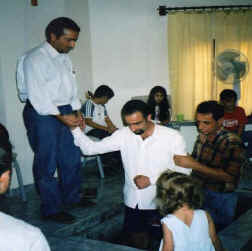
Nejati
baptizing Uğur
He
returned to Elazığ, wanting to start some business, but he had no money.
He chose the line of mobile phone sales.
He was able to obtain a loan from a bank through the assistance of
some friends. At this point, he applied to officially
change his religious identity from ‘Muslim’ to ‘Christian’.
His application was accepted and he was very happy for his new
designation. But
his work did not progress,
as is the case of so many small business enterprises in
Turkey
. He was on the verge of
bankrupcy. It was a very hard
period. He later described it as a time when his heavenly Father was
allowing him to be tested, a time of maturing and growing in the faith.
He didn’t revolt, but gave himself to earnest prayer.
However, in the meantime, the interest of his debt was
accumulating. He utilized this
time to search answers to the quandaries that were troubling him.
The assurance of God’s mercy and goodness gave him the certainty
that his heavenly Father would provide a way out. He had an invitation to
go outside the country for a job, but he turned it down.
He was convinced that God wanted him to stay in Turkey and that He
would bring the solution to his problems.
At this time Uğur
moved to Malatya and started attending the fellowship.
Nejati with his family were already working in Malatya. A strong
bond developed between these two men.
Both of them were were inclined to express their faith in poetry.
Uğur was greatly encouraged with the new relationship.
Following a week of prayer between the two, Uğur accepted the
offer to work at Zirve. He was
delighted that he was no longer in secular
work. In time, God provided for the payment of all his debts.
Now he was deeply involved in ministering for Christ.
His love for the Savior increased and he enjoyed the fellowship
with Christ and his people more and more.
The work at Zirve continued a year and a half.
During this short time, he proved himself a worthy witness and
valuable worker for Jesus Christ. He also became engaged to a young
Turkish woman who had confessed Christ as her Savior. (Ed. At the time of
this writing, she has vanished from the scene, not desiring any contact
with Christians.) God in his providence had planned this ministry for Uğur
on the way to his promotion to martyrdom.
His usefulness for the kingdom of Christ was exemplary, finally
being sealed by giving his life as an offer to the Savior.
One Year On
A
year after the death of the three martyrs, fellow-believers and friends
participated in four separate commemorative services ― graveside
remembrances in Malatya, Elazığ and Izmir.
The one in Istanbul was a general service for all the men which was
open to the public, country-wide. The
Izmir
service a week later was observed by Shemse Aydin and her children Elisha,
8, and Ester, 5, where Nejati Aydin had been buried just weeks before his
36th birthday. The commemoration for Tilmann Geske was held at his
graveside in the old Armenian cemetary in Malatya.
His widow Susanne and the three children, along with thirty-five
other mourners joined in the solemn celebration of Christ’s victory over
death. Pastor İhsan Özbek from Ankara emphasized that Christians do
not grieve as those who have no hope, which truth was also expressed in
worshipful songs.
Uğur Yuksel’s quiet memorial service took place in Son, a
small village near Elazığ. On
his tombstone was written one of his favorite Psalms: “Whom
have I in heaven but you? And earth has nothing I desire besides you”
(73:25). At the foot of his gravestone was written: “He was killed
like Jesus.” (Ed. I wonder if this witness is still there.) Pastor Ahmet
Güvener of Diyarbakır led the short service of prayer, hymn-singing
and Scripture reading. About
twenty of Uğur’s friends and his parents, still Alevis, were
present. People’s identity cards were carefully scrutinized by the local
gendarme who stopped each car as the little procession slowly made its way
to the cemetery. That, and the
videotaping by Doğan News Agency of the entire service were taken as
intrusions of a private ceremony to implicate participants in the
Christian service.
Zirve,
where the three martyrs had been engaged in literature selling and
distribution, immediately placed a large, bold-print notice in
Sabah
, a national daily
newspaper. The traditional black-bordered commemoration of the
three martyrs’ death read: “We
remember with love and longing the ones mercilessly taken from us a year
ago. In the hope of our faith,
we will be together with you again beside our Heavenly Father.
We have not forgotten you.”
On
Sunday, April 20th, a nationwide memorial service was held in
Istanbul
. More than nine-hundred
sorrowing Christians from all across
Turkey
gathered in the St. Esprit Catholic Cathedral for the ninety-minute
commemoration of the lives and deaths of the three martyrs.
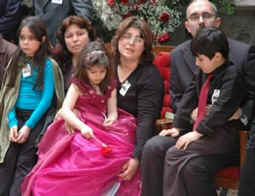
Grieving
Shemse and children at
Istanbul
commemoration service
Shemse
Aydin and Susanne Geske sat side-by-side with their five children in the
front row of the cathedral. Local
clerics of both Orthodox and Catholic communities, foreign diplomats and
several of the lawyers representing them in the murder trial joined them.
Both Shemse Aydin and Susanne Geske briefly related to the large
crowd the difficulties they were going through, but also the courage and
hope they were daily experiencing through God’s Word and
fellow-Christians. “Every day without Nejati this past year
has been a bitter cup for me to drink,’ Aydin said. Geske quoted the
Turkish words she had requested to be placed on her husband’s tombstone:
“He came to serve the people of
Malatya
, but the people he came to serve killed him.” As a
fifteen-minute collage of photos of their fathers and ‘Uncle Uğur’,
along with recordings of their singing and testifying were projected
overhead, the grieving children couldn’t hold back their tears.
Among the crowd was another sorrowing widow, Rakel Dink, who joined
the commemorative gathering. Her
husband, Hrant Dink, the well-known Armenian journalist had been gunned
down in front of his office by an extreme nationalist teen-ager three
months earlier. His death was
reported around the world.
Turkish government officials and the Turkish press had been sent
formal invitations to the
Istanbul
service by the Alliance of Turkish Protestant Churches, who sponsored the
memorial gathering. But the English-language Turkish Daily News and the liberal Cumhuriyet were the only newspapers who made mention of the event.
In
his closing address Pastor
Zekai Tanyar
of
Izmir
spoke directly to Turkish officials to awaken to the realities taught in
Christian Scriptures. He
passionately declared, “Those who sow death cannot reap life; those who
sow evil cannot reap goodness. Those who sow curses cannot receive
blessing. I knew Nejati, Uğur
and Tilmann, and especially Nejati very well,” Tanyar said.
“I laugh bitterly to hear the unscrupulous lies told about them.
The only crime by three brothers committed was believing in God, following
Jesus and telling people about God’s message of love and hope for
them.”
Tanyar
spoke against the common mindset that to be Turkish is to be Muslim.
“Give permission for my faith, and let the Creator be the
judge!” Tanyar pled. “My
heart loves my country and my Lord, and no slander, anti-propaganda,
pressure
or politicians can change that!”
At
the close of the solemn and moving ceremony numerous participants made
their way to the front to place long-stemmed red roses and flickering
candles at the altar.
A special edition of the Christian magazine
Gerçeğe
Doğru (Toward the Truth) dedicated to the Malatya martyrs was distributed
in the cathedral courtyard, along with the newly-published book of Nejati
Aydin’s poetry, My Name is written
in Heaven.
After the Malatya
massacre, intense dark clouds have been cast over the body of Christ in Turkey. The
small evangelical community has declared April 18 as an annual Day of Prayer
for Turkey
and for the progress of Christ’s gospel in this land.
In spite of all prevailing adversity the church is advancing,
resolutely persevering in the strength of the Holy Spirit.
A portentous line from Thomas S. Eliot (1888-1965) is apropos to
bolster every follower of Christ, the Victor, and to buttress every single
fellowship: “Darkness declares the
glory of light.”
The Murder in
Gaza
Whether
coincidental or conspirational, six months after the killings in
Malatya
another gallant and effective servant of Christ, Rami Ayyad, 26, became a
martyr for his Lord in
Gaza
. Rami Ayyad of the Gaza Bible
Society bookstore, ‘The Teacher’s Bookshop’, was kidnapped and
brutally murdered. Ayyad,
along with being front face for the Bible Society in
Gaza
, was also active in the
Baptist
Church
, helping with the Awana club and directing the summer children’s camps.
He was married to Pauline. They had two young children, with his
wife imminently expecting their third child.
When Rami Ayyad heard about the murders in
Malatya
, he felt deeply grieved and expressed his sorrow for the widows.
At that time he remarked that for a Christian, being martyred was
the best way to die, and added that if the time came for him to go, he
wouldn’t hesitate to lay down his life for Christ.
A day before his kidnapping,
October 5, 2007
, Ayyad noticed a car without license plates following him. On October 6,
he had just closed the bookshop at about
6 P.M.
when he was kidnapped. He called his wife, saying that he had been taken
away and would return home in about two hours. But he added that if he
didn’t show up then he wouldn’t be coming back for a long, long time.
At
6:25
on Sunday morning, October 7, his mutilated body was found outside the
Bible Society bookstore where he had so devotedly served.
Many stab and bullet wounds were clearly evident, his head also
having sustained severe injury. Before
the murder he had received numerous death threats and was always aware
that his life was in danger. At
the discovery of his dead body, the whole Gazan Christian community of
about 4,000 people was thrown into deep sorrow and shock.
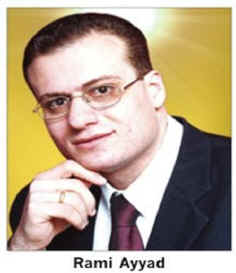
On
April 15, 2007
, a bomb destroyed the downstairs store front of the bookshop.
Before that, on
February 3, 2006
, local militants detonated two small pipe bombs, destroying the store’s
doors. At that time the
employees of the Bible Society found a communiqué demanding that the shop
be closed immediately. This
bore the signature of the secretive ‘Sword of Islam’.
Rami Ayyad was the gentlest member of the Bible Society, always
smiling, and serving all who came into the shop as Jesus would have done.
The Interior Minister of Hamas said that the crime would not go
unpunished. But nothing has
been done to solve it. Besides
operating the bookstore, the Bible Society also offered computer courses
to the 1.4 million Gazans, most of whom are unemployed.
They were also involved in providing food and clothing for the many
refugees. Before the murder,
many of
Gaza
’s citizens actually demonstrated in appreciation of the Bible
Society’s services, demanding that their presence in
Gaza
City
continue. However, this was
not to be. The Bible Society
bookstore was ultimately closed, leaving this large city without the
provision of Scriptures and many social services.
Rami Ayyad’s death marked another promotion to glory of one of
God’s faithful servants. Every
day others are following in the train of Rami and those killed in
Malatya
.
“When he opened the fifth seal, I saw under the altar
the souls of those
who had been slain for the word of God and for the
witness they had borne.
They cried out with a loud voice, ‘O Sovereign Lord,
holy and true,
how long before thou wilt judge and avenge our blood on
those
who dwell upon the earth?’
Then they were each given a white robe and told to rest
a little longer,
until the number of their fellow servants and their
brethren should be complete,
who were to be killed as they themselves had been.”
(Revelation 6:9-11)
Thomas Cosmades – 2008

